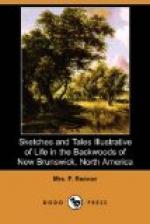A neighbour of his had come out from England at the same time he had done and commenced farming an adjoining lot, but he soon wearied of the slow returns of his land and commenced lumbering. For a time he went on dashingly, the merchants in town supplying him freely with provisions and everything necessary to carry on his timber-making—whilst Stephen worked hard and lived poor, he enjoyed long intervals of ease and fared luxuriantly. But a change came: one spring the water was too low to get his timber down, the next the freshet burst at once and swept away the labour of two seasons, and ere he got another raft to market, the price had fallen so low that it was nearly valueless. He returned dispirited to his home and tried to conceal himself from his creditors, the merchants whom the sale of his timber was to have repaid for the supplies they had advanced; but his neglected fields showed now but a crop of bushes and wild laurel, or an ill-piled clearing, with a scanty crop of buck-wheat; while Stephen Morris looked from his window on fair broad fields from whence the stumps had all disappeared, where the long grass waved rich with clover-flowers between, and many a tract that promised to shine with autumn wreaths of golden grain; leaflets and buds were close and thick on the orchard he had planted, and where erst the wild-bush stood now bloomed the lovely rose. On a green hill before him stood the lofty frame of the building this evening raised, with all its white tracery of beam and rafter, a new but welcome feature in the landscape. A frame barn is the first ambition of the settler’s heart; without one much loss and inconvenience is felt. Hay and grain are not stacked out as in other countries, but are all placed within the shelter of the barn; these containing, as they often do, the whole hay crop, besides the grain and accommodation for the cattle, must, of course, be of large dimensions, and are consequently expensive. With this Stephen had proceeded surely and cautiously as was his wont. In the winter he had hauled logs off his own land to the saw-mill to be made into boards. He cut down with much trouble some of the ancient pines which long stood in the centre of his best field, and from their giant trunks cut well-seasoned blocks, with which he made shingles in the stormy days of winter. Thus by degrees he provided all the materials for enclosing and roofing, and was not obliged, as many are, to let the frame, (which is the easiest part provided, and which they often raise without seeming even to think how they are to be enclosed,) stand for years, like a huge grey skeleton, with timbers all warped and blackened by the weather. Steadily as Stephen had gone on, yet as the completion of his object became nearer he grew impatient of its accomplishment, and determined to have his barn ready for the reception of his hay harvest; and for this purpose he worked on, hewing at the frame in the spring, reckless of the penetrating rain, the chill wind, or the damp




